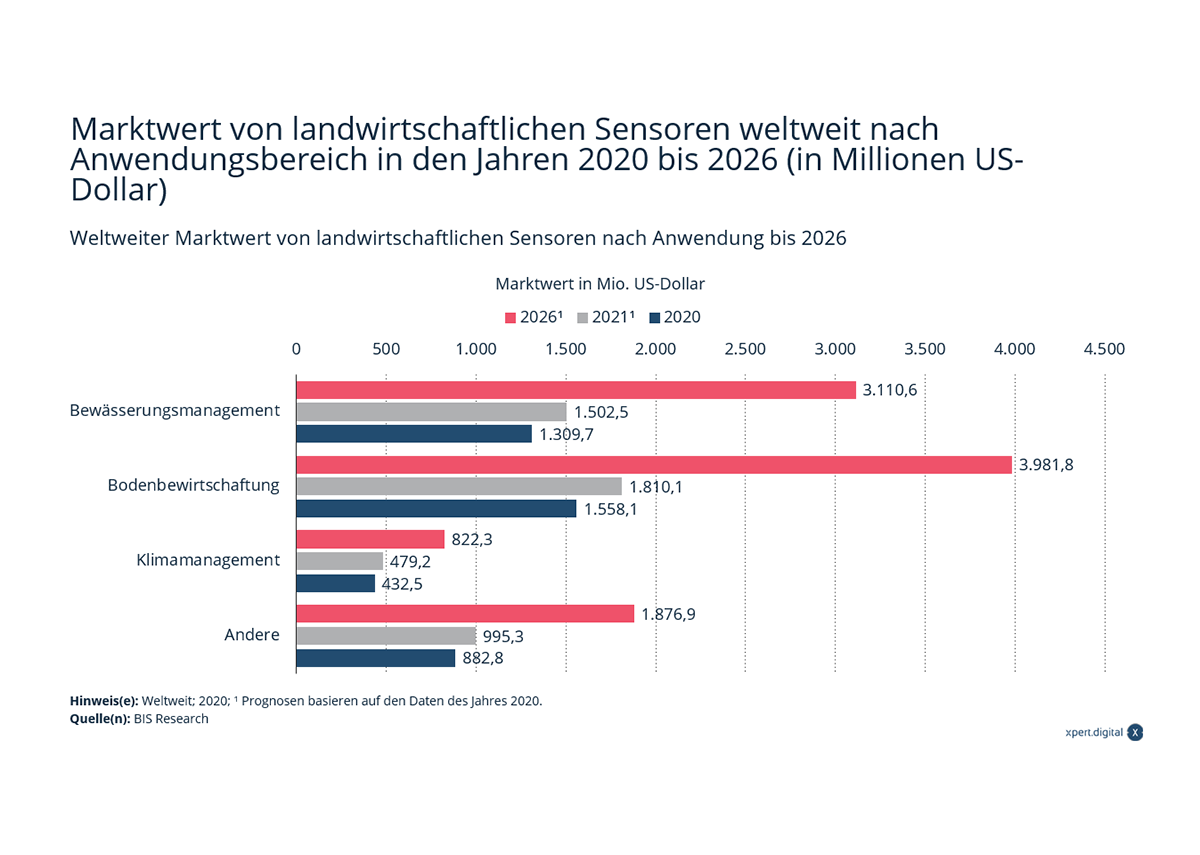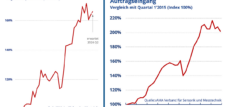
Smart agriculture: Innovation and growth through sensor technology – Market value of agricultural sensors worldwide – Image: Xpert.Digital
🌐🌽 The future of agriculture: Innovative sensor technologies and their global significance until 2026
🌾🌐 Smart Agriculture: The Future of Agricultural Technology 🚜🛰️
Smart agriculture, also known as precision agriculture, is a growing field that utilizes modern technologies to increase efficiency and productivity in agriculture. Of particular note is the use of sensors, which enable precise monitoring and control of various agricultural processes. These technologies are gaining importance worldwide because they promote the sustainable use of resources and can maximize yields. This text examines the development of the agricultural sensor market up to 2026, focusing specifically on irrigation management, soil management, and climate management.
🌱📊 Market Analysis: Growth and Forecasts 📈🌏
According to a study by BIS Research, the market value for agricultural sensors will increase significantly by 2026. This rise is due to the growing acceptance and integration of smart technologies in agriculture. In 2020, the global market value for agricultural sensors was approximately US$4.183 billion, and it is expected to grow to approximately US$12.791 billion by 2026.
💦💧 Irrigation management 🌿🌧️
Irrigation management is a critical area where sensors play a significant role. These sensors monitor soil moisture, weather conditions, and plant growth to precisely control irrigation. This saves water and ensures plants receive exactly the amount of moisture they need.
In 2020, the market value for sensors used in irrigation management was US$1,309.7 million. This value is expected to rise to US$3,110.6 million by 2026. This increase reflects the growing awareness of the need for efficient water use, particularly in regions affected by water scarcity.
🌍🌿 Soil management 🚜🌾
Sensors used in soil management monitor parameters such as soil temperature, moisture, nutrient content, and pH value. This information is crucial for optimizing plant health and crop yields. The data helps farmers better understand soil conditions and take targeted measures to improve soil quality.
The market value for sensors used in soil management was US$1,558.1 million in 2020 and is projected to rise to US$3,981.8 million by 2026. This demonstrates the increasing importance of precise soil analysis for sustainable and productive agriculture.
🌦️🌡️ Climate management 🌾🌬️
Climate management involves monitoring and adapting to climatic conditions that affect plant growth. Sensors collect data on temperature, humidity, wind speed, and solar radiation. This data helps farmers adapt their cultivation methods to changing climatic conditions and thus minimize crop losses.
In 2020, the market value for climate management sensors was US$432.5 million. This market is expected to grow to US$822.3 million by 2026. The increasing demand for these sensors is a response to the growing challenges posed by climate change and the need to adapt agriculture to these changes.
🧪💡 Innovations and technologies 🤖🌾
The ongoing development of sensor technology is driving smart agriculture forward. Notable innovations include:
🌐📡 IoT (Internet of Things) 🔗🌽
The IoT connects various devices and sensors via the internet, enabling them to exchange data in real time. In agriculture, the IoT facilitates seamless integration and communication between sensors, machines, and management systems. This leads to more efficient and precise farm management.
🚁🛰️ Drones and satellites 📸🌱
Drones and satellites are increasingly being used to monitor fields. They provide high-resolution images and data that can be used to analyze plant growth, pest infestations, and soil conditions. These technologies enable large-scale and detailed monitoring that would not be possible with conventional methods.
🧠🤖 Artificial Intelligence (AI) and Machine Learning (ML) 📊📈
AI and ML play a crucial role in analyzing the vast amounts of data collected by sensors and other technologies. By using algorithms, patterns and trends can be identified, helping farmers make informed decisions. For example, ML models can predict crop yields, optimal planting times, and potential disease outbreaks.
🌾⚙️ Advantages of smart agriculture 🌱💡
The introduction of smart technologies in agriculture offers numerous advantages:
🔍🎯 Increased efficiency 💧⚖️
Precise monitoring and control of agricultural processes allows for more efficient use of resources such as water, fertilizers, and pesticides. This not only reduces costs but also minimizes environmental impact.
📈🏆 Maximizing yield 🌿🌽
Precision agriculture makes it possible to better understand the needs of plants and respond to them in a targeted manner. This leads to higher yields and improved crop quality.
♻️🌎 Sustainability 🌍🌱
The efficient use of resources and the reduction of waste contribute to more sustainable agriculture. This is particularly important given the growing global population and the associated increase in demand for food.
🚨🎛️ Risk minimization 🔍🌾
Continuous monitoring and data analysis allow potential problems to be identified early and corrective action to be taken. This reduces the risk of crop losses and other negative impacts.
🛠️🔍 Challenges and future perspectives 📊🚜
Despite the numerous advantages, there are also challenges that must be overcome:
💸💼 Costs 📉⚙️
Acquiring and implementing smart technologies can be costly. Smaller businesses, in particular, may struggle to make the necessary investments.
📊🔧 Data Management 💽🌾
Collecting and processing large amounts of data requires powerful IT systems and expertise. Farmers must be able to interpret the collected data and use it effectively.
📚🎓 Acceptance and training 👨🌾🤖
The acceptance of new technologies often requires a change in traditional working methods. Training programs and further education are necessary to familiarize farmers with the new technologies.
🌿🚀Smart agriculture and continuous development of sensor technology 🌾🔍
Smart agriculture faces a promising future. With the continuous development of sensor technologies and their integration into agricultural processes, efficiency, yields, and sustainability can be significantly increased. The anticipated increases in market value by 2026 underscore the enormous potential of these technologies. However, to fully realize these benefits, existing challenges must also be addressed and overcome. The future of agriculture lies in the intelligent use of modern technologies – a development that can not only revolutionize agricultural production but also make a significant contribution to securing global food supplies.
📣 Similar topics
- 🌾📈 Sensors as the key to efficiency: The market for smart agriculture until 2026
- 🌍💧 Sustainable irrigation: How sensors can overcome water scarcity
- 🌱🛠️ Precise soil management: Data-driven innovations by 2026
- ☀️🌿 Climate management in agriculture: Technologies for a secure future
- 🚜📊 Growth and forecasts: The market value of agricultural sensors until 2026
- 🌐🌽 IoT in agriculture: Networked efficiency for maximum yields
- 🎯📡 Drones and satellites: High-resolution surveillance to optimize fieldwork
- 🤖📉 Artificial intelligence in agriculture: Data analysis for better decisions
- 🌟📊 Advantages of smart agriculture: increased efficiency, yield maximization and sustainability
- 🛠️📉 Overcoming challenges: Costs, data management and acceptance of new technologies
#️⃣ Hashtags: #SmartAgriculture #PrecisionAgriculture #DigitalAgriculture #SensorTechnology #Sustainability
We are there for you - advice - planning - implementation - project management
☑️ Industry expert, here with his own Xpert.Digital industry hub with over 2,500 specialist articles
I would be happy to serve as your personal advisor.
You can contact me by filling out the contact form below or simply call me on +49 89 89 674 804 (Munich) .
I'm looking forward to our joint project.
Xpert.Digital - Konrad Wolfenstein
Xpert.Digital is a hub for industry with a focus on digitalization, mechanical engineering, logistics/intralogistics and photovoltaics.
With our 360° business development solution, we support well-known companies from new business to after sales.
Market intelligence, smarketing, marketing automation, content development, PR, mail campaigns, personalized social media and lead nurturing are part of our digital tools.
You can find out more at: www.xpert.digital - www.xpert.solar - www.xpert.plus

